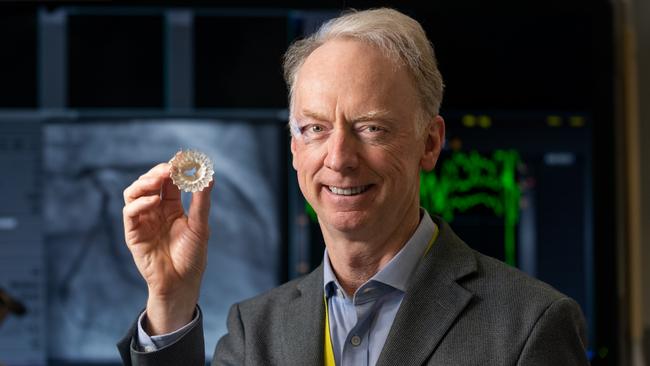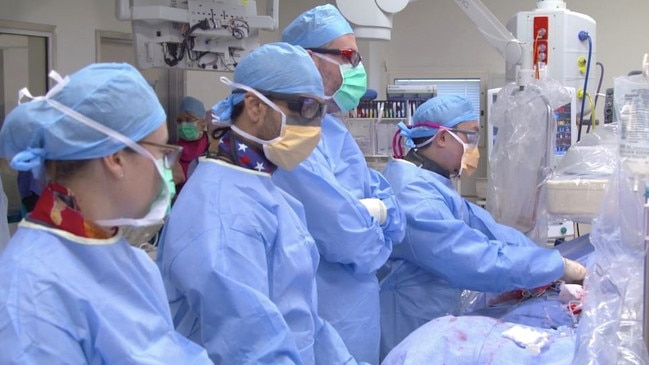Be vigilant: Stealthy heart disease can be treated without major surgery but it’s going undetected
Almost half of all Australians at risk of heart valve disease have never heard of it. A pioneer in its treatment is calling for vigilance.

Heart valves that slowly fail like a door with “rusty hinges” are not being detected early enough even though they can be treated with a simple replacement valve and no open heart surgery, a cardiac pioneer has warned.
The Australian pioneer of keyhole heart valve surgeries is raising the alarm on an increase in cardiac issues as Heart Valve Disease (HVD) cases avoid scrutiny, while many patients are unaware of its risks.
Renowned Alfred Hospital cardiologist Tony Walton has called for patients and doctors to be more vigilant in checking for HVD which develops slowly and is sometimes mistaken simply as fatigue or shortness of breath as people get older.
Professor Walton has led modern heart treatment for 35 years, first through keyhole surgery and then by introducing transcatheter heart valve replacements to Australia which have helped thousands of patients from having to undergo open heart surgery.
Transcatheter Aortic Valve Implantation (TAVI) allows for the replacement of heart valves to be placed in heart without a major incision and Professor Walton said demand for urgent TAVIs was rising, under a wave of undiagnosed HVD cases.
“It’s like the valve has arthritis in it or rusty hinges and simply doesn’t open properly, but it develops very slowly over many, many years and so if the patient is already seeing a cardiologist, they’ll know about it. But if it’s undiagnosed and untreated they don’t even know what’s happening,” Professor Walton said.
“It often presents as just a bit more fatigue. They get a bit more short of breath or just slow down, which, when you’re 80 years old, people think that’s a normal part of life. Unless the doctors are listening to their hearts it sometimes remains undiagnosed until very late in its course.
“It’s pretty simple to diagnose this condition … I think both patients and GPs need to be vigilant about it.”
About 500,000 Australians have been diagnosed with HVD, however the Cardiac Resource Centre estimates that more than 250,000 suffer the condition without realising it.
Data gathered by medical device producer Medtronic indicated almost 48.2 per cent of all Australian patients had never heard of HVD, despite a well-founded concern for coronary health among the general population. Of the cohort of over-65s, 76.8 per cent were currently seeing a cardiologist.

“A lot of this is still underdiagnosed and about one in four of these TAVIs that we do at the Alfred are done on urgent inpatients,” Professor Walton said.
“Diagnosis is key. There’s increasing evidence that (we should be) treating patients earlier in this journey … The question now is if somebody has moderately narrow arteries, are you better off treating it earlier on before it starts to cause more damage to the heart?
“It’s really quite a revolution, and we don’t use the word revolution in medicine terribly often, but there’s no question that TAVI valves have been a revolution for a common and serious condition which universally required heart surgery.
“It’s become a very common procedure for what is essentially a very serious condition … We can now offer this to people and they can be home in 48 hours.”
HVD causes arrhythmias, strokes and heart failure when left untreated, occurring when heart valves impinge on blood flow causing fatigue and chest pain.
Heart Foundation chief medical officer Garry Jennings said Australia’s ageing population and rising medical vigilance had contributed to an increasing rate of HVD diagnosis.
“People that previously would’ve passed away with a major heart attack or with frequent heart attacks earlier in life are now living long enough to be old but to suffer from some of the consequences like atrial fibrillation and heart failure,” he said.
“Heart valve disease is a little different in that it’s not as directly related to heart disease in younger life but it’s also something that creeps up on people as they get older.
“The main thing is to have a heart health check, which is available on Medicare for anybody between the ages of 45 and 75.”





To join the conversation, please log in. Don't have an account? Register
Join the conversation, you are commenting as Logout